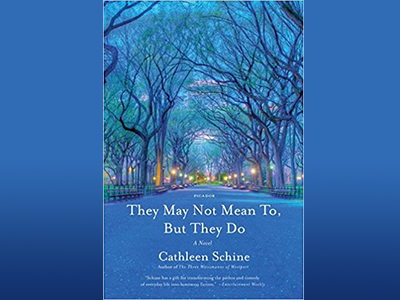
They May Not Mean To, But They Do by Cathleen Schine
Growing older, taking care of an aging spouse, learning to live alone -- I don't know how Cathleen Schine wrings humor from these experiences, but she does. They May Not Mean To, But They Do is filled with hilarious and very human details, and it is a novel I savored.
The story opens with a brief New York family history, coming down to Joy and her husband Aaron who suffers from bladder cancer and dementia. Joy tends to Aaron with wry patience. In one of the first scenes, Aaron's repetitious questioning annoys his wife to the point where she finally says mildly, 'If you ask me that one more time, I'm putting a bag over your head.' Anyone who has taken care of an elderly person knows that impulse, but a tender moment immediately follows, setting up the interplay between sarcasm and sentiment that continues throughout the book.
Cathleen Schine draws the characters so clearly that each can narrate the story from their point of view, sometimes within a few paragraphs, without any confusion for the reader. In New York, Daniel, the hardworking, perpetually exhausted son, his wife Coco, and their precocious young daughters Ruby and Cora could be a novel in themselves. Ruby accidentally injures a rabbi, an incident which propels her to become fascinated with the family's ancestors and with Judaism. She begins to study for her bat mitzvah, to her mostly non-observant family's surprise.
Meanwhile, Joy and Aaron's daughter Molly lives in California with her wife Freddie. The women spend some time coping with Freddie's aging father, a lecherous retired actor who gets kicked out of one assisted living facility after another. 'Never underestimate a minor character actor,' Freddie says of her father. 'It's already been done. Their whole life.' When Molly finds it necessary to journey cross-country to assist her mother, Freddie asks why her brother in New York can't take over, and both women know why. Daughters are most often the caregivers. Still, Molly bristles – even a hint of criticism of her family is 'off-limits.' Freddie understands and respects the 'insular ferocity' of her wife's family, and the loyalty that holds them together.
This closeness is tested when Aaron becomes more ill, and the family comes together to support their mother. Molly tries to avoid the messy details of hospice care, but Joy talks about them as ordinary, necessary parts of life, as caregivers must. When Aaron enters palliative care and then passes away, confusion and heartbreak strike everyone, Joy most of all. Her grief is all-consuming. Eventually, out for a walk, she encounters one of her husband's 'park friends,' Karl, and an old friendship/romance is rekindled. Her children are scandalized; they see Karl as an intrusion and an insult to their father's memory.
In an effort to help out (and separate the elderly friends), Molly and Freddie bring Joy to California to live with them, but Joy couldn't be less suited to West Coast culture. Even back in New York, Joy feels out of place as a 'useless' older women. 'I've lost touch with normal social behavior,' she says, 'and when I find out what is expected, I don't like it.'
There are so many laser-accurate observations and perfect gems of wit in this book. Take this description of traffic court, the 'round-shouldered resentment' that 'permeated the space.' There's another passage when young Ruby compares the vengeful Hebrew God to a growling, snapping Lassie coming back from World War II with PTSD. Even as the families confront loss and sorrow, we see the humor that sustains them, and the respect they still have for each other. For instance, watching her father's slow, deliberate movements as he stands to greet someone, Molly wonders ''Why don't we revere the elderly?' She knew why. They were difficult and inconvenient. But how brave her father was just by standing up, by insisting on the code of conduct he'd been brought up with, by being, simply, polite.' These are the flashes that illuminate every page of Schine's writing.
The book ends rather abruptly, with a moment of satisfaction for Joy that seemed unearned. But then I have to admit, my only real complaint with this book was that it ended; like a wonderful friendship, I just wanted it to go on, which it will in my memory and imagination.
by Jan Hardy, Cataloging Specialist
